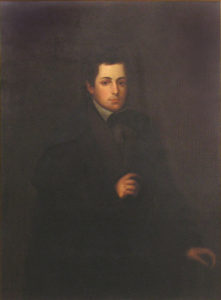Thomas Slidell
Thomas Slidell served as chief justice of the Louisiana Supreme Court from 1853 to 1855.

Courtesy of The Law Library of Louisiana
Thomas Slidell. Unidentified
Thomas Slidell was the second chief justice of the Louisiana Supreme Court, serving from May 4, 1853, to June 18, 1855. Slidell’s influence on Louisiana law was notable for his scholarly opinions and his reliance on common law principles in deciding questions of commercial and partnership law. He confirmed the identity of Louisiana as a mixed jurisdiction, blending the legislative authority of a civil law jurisdiction with the reliance on precedent of a common law state. In his book From Chaos to Continuity: The Evolution of Louisiana’s Judicial System, 1712–1862, historian Mark F. Fernandez describes an 1839 case, Reynolds v. Swain et al. (13 La. Ann. 193), in which Slidell represented Swain on a partnership question. Slidell’s argument and the decision then rendered by Presiding Judge F. X. Martin defined the independence of the judiciary in Louisiana. Fernandez states that “Slidell’s role in bringing the court more in concert with a larger American legal tradition marked a significant reform.”
Born in 1805 in New York City to John and Margery Slidell, Thomas Slidell belonged to a prominent merchant family. He graduated from Yale College in 1825, and after studying and traveling through Spain for a year, he settled in New Orleans, where his older brother, John Slidell, had already become an important voice in antebellum Democratic politics. John Slidell served as Minister to Mexico in 1846, was elected US senator from Louisiana (1853–1861), and achieved prominence in the administration of the Confederacy. Other siblings of note included Jane Slidell, who married Commodore Matthew Perry, and Alexander Slidell Mackenzie, a naval officer and author.
Thomas Slidell practiced law in New Orleans and became an expert in partnership laws . In 1834 he coedited with his law partner, Judah P. Benjamin, A Digest of the Reported Decisions of the Superior Court of the Late Territory of Orleans and of the Supreme Court of the State of Louisiana, which Slidell then revised in 1840. He was appointed US District Attorney for the eastern district of Louisiana in 1837, a post he held for several years before his election to the state senate in 1844. In 1846 Gov. Isaac Johnson appointed Slidell associate justice of the Supreme Court of Louisiana under the 1845 state constitution. The Constitution of 1852 changed the selection of Louisiana Supreme Court justices to an elective process, and Slidell was elected to a ten-year term as chief justice in 1852. He resigned in 1855, according to some sources due to overwork and exhaustion.
In the turbulent state election of 1856 Slidell sustained a serious head injury during a vicious attack, and his health declined. For a time he was confined to Butler Hospital in Rhode Island. Slidell died at his family’s residence in Newport, Rhode Island, on April 20, 1864. He was married to Frances Callender of New York and had one surviving son, William J. Slidell, who was an officer in the Union army.
